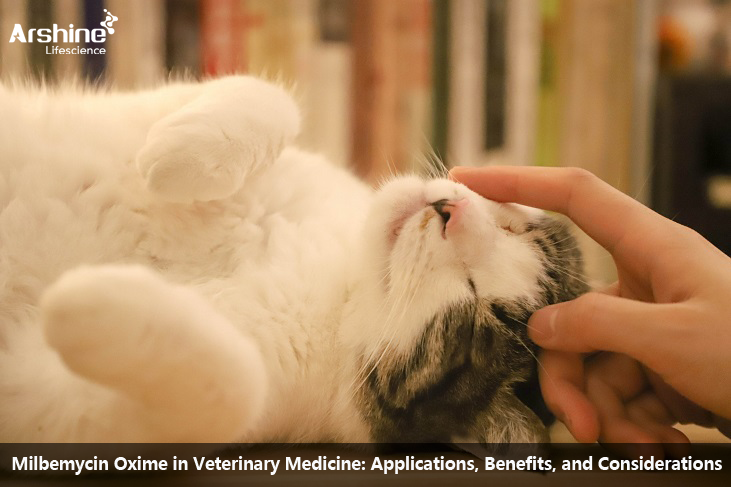

Milbemycin oxime is a prominent compound in veterinary medicine, widely recognized for its efficacy in treating and preventing parasitic infections in animals. This macrocyclic lactone anthelmintic has become a cornerstone in the management of various parasitic infestations, particularly in dogs and cats. Understanding the applications, benefits, and considerations of milbemycin oxime is crucial for veterinarians and pet owners alike. This comprehensive guide delves into the multifaceted use of milbemycin oxime in veterinary practice, exploring its mechanisms, advantages, and essential precautions.
Milbemycin oxime exerts its antiparasitic effects by interfering with neurotransmission in parasites. Specifically, it enhances the release of gamma-aminobutyric acid (GABA) and binds to glutamate-gated chloride ion channels in the parasite's nervous system. This action leads to increased permeability of the cell membrane to chloride ions, resulting in hyperpolarization, paralysis, and eventually the death of the parasite. Notably, milbemycin oxime is effective against a broad spectrum of parasites, including nematodes, mites, and certain ectoparasites.
Heartworm disease, caused by the parasitic worm Dirofilaria immitis, is a severe and potentially fatal condition affecting dogs and cats. Milbemycin oxime is a key ingredient in many heartworm preventive medications. Administered monthly, it effectively kills the larval stages of the heartworm, preventing them from maturing into adult worms that can cause significant cardiovascular and pulmonary damage.
Milbemycin oxime is highly effective against a range of intestinal parasites, including roundworms (Toxocara canis, Toxascaris leonina), hookworms (Ancylostoma caninum, Uncinaria stenocephala), and whipworms (Trichuris vulpis). By eliminating these common gastrointestinal parasites, milbemycin oxime helps maintain the overall health and well-being of pets, reducing the risk of malnutrition, anemia, and other associated health issues.
Demodectic mange, caused by Demodex mites, can lead to severe skin infections in dogs. Milbemycin oxime has proven to be an effective treatment for this condition. By targeting the mites, it helps reduce the population on the skin, alleviating the symptoms and promoting recovery. Treatment typically involves daily or weekly administration, depending on the severity of the infestation and the veterinarian’s recommendations.
Ear mites (Otodectes cynotis) are a common cause of ear infections in cats and dogs. Milbemycin oxime, when formulated in topical solutions or ear drops, can effectively eliminate these mites, providing relief from itching, irritation, and secondary bacterial infections. Regular use as prescribed can help prevent recurrence and maintain ear health.
Milbemycin oxime is often combined with other antiparasitic agents to provide broad-spectrum protection. For instance, it is frequently paired with lufenuron, praziquantel, or spinosad in products designed to control fleas, ticks, and a variety of internal parasites. These combination products offer convenient, all-in-one solutions for pet owners, simplifying the process of parasite control and prevention.
One of the primary advantages of milbemycin oxime is its broad-spectrum efficacy against multiple types of parasites. This versatility makes it an invaluable tool in comprehensive parasite management programs for pets.
Milbemycin oxime is generally well-tolerated by dogs and cats. Adverse reactions are rare and typically mild, making it a safe option for regular use. However, it is essential to follow the prescribed dosage and administration guidelines to minimize the risk of side effects.
Milbemycin oxime is available in various formulations, including oral tablets, chewable tablets, and topical solutions. This variety allows veterinarians and pet owners to choose the most suitable and convenient option for the animal, ensuring compliance with treatment and preventive protocols.
By effectively controlling parasites that can be transmitted from animals to humans (zoonoses), such as roundworms and hookworms, milbemycin oxime plays a crucial role in safeguarding public health. Regular use of this anthelmintic in pets reduces the risk of human exposure to these parasites.
Proper dosing is critical to the efficacy and safety of milbemycin oxime. Veterinarians must calculate the appropriate dosage based on the animal’s weight and specific health needs. Overdosing can lead to serious side effects, including neurological symptoms, while underdosing may result in inadequate parasite control.
Certain dog breeds, particularly those with the MDR1 (multidrug resistance) gene mutation, such as Collies and other herding breeds, may be more sensitive to milbemycin oxime. Genetic testing can help identify these breeds, allowing veterinarians to adjust dosages or choose alternative treatments as needed.
While adverse reactions to milbemycin oxime are rare, they can occur. Common side effects include vomiting, diarrhea, and lethargy. More severe reactions, though uncommon, may involve neurological symptoms such as tremors, ataxia, or seizures. Pet owners should monitor their animals closely after administration and report any concerning symptoms to their veterinarian.
Milbemycin oxime should not be used in animals with known hypersensitivity to the drug. Additionally, it is essential to consider potential drug interactions, especially when used in combination with other medications. Veterinarians should review the animal’s medication history and current treatments to avoid adverse interactions.
The safety of milbemycin oxime in pregnant and lactating animals has not been fully established. Veterinarians must weigh the potential benefits against the risks when considering its use in breeding animals. Alternative treatments may be recommended if the safety profile is uncertain.
Advancements in veterinary pharmacology continue to enhance the efficacy and safety profiles of antiparasitic agents like milbemycin oxime. Ongoing research aims to develop new formulations and combination products that provide even broader protection against emerging parasitic threats. Additionally, efforts to improve genetic testing for breed sensitivities will enable more personalized and precise treatment protocols.
Milbemycin oxime is a vital component in the arsenal of veterinary medicine, offering robust protection against a wide array of parasitic infections. Its broad-spectrum efficacy, safety, and ease of administration make it a preferred choice for veterinarians and pet owners. By understanding the applications, benefits, and considerations associated with milbemycin oxime, veterinary professionals can ensure optimal health outcomes for their animal patients. As research and development in this field progress, milbemycin oxime will likely continue to play a pivotal role in the prevention and treatment of parasitic diseases in companion animals.
Add: Block 14, No.100, Luyun Road, Changsha 410205, Hunan, China.
Email: info@arshinevet.com
WeChat: +8618874001228
WhatsApp: +8615697311407
Tel:86-731-82294958